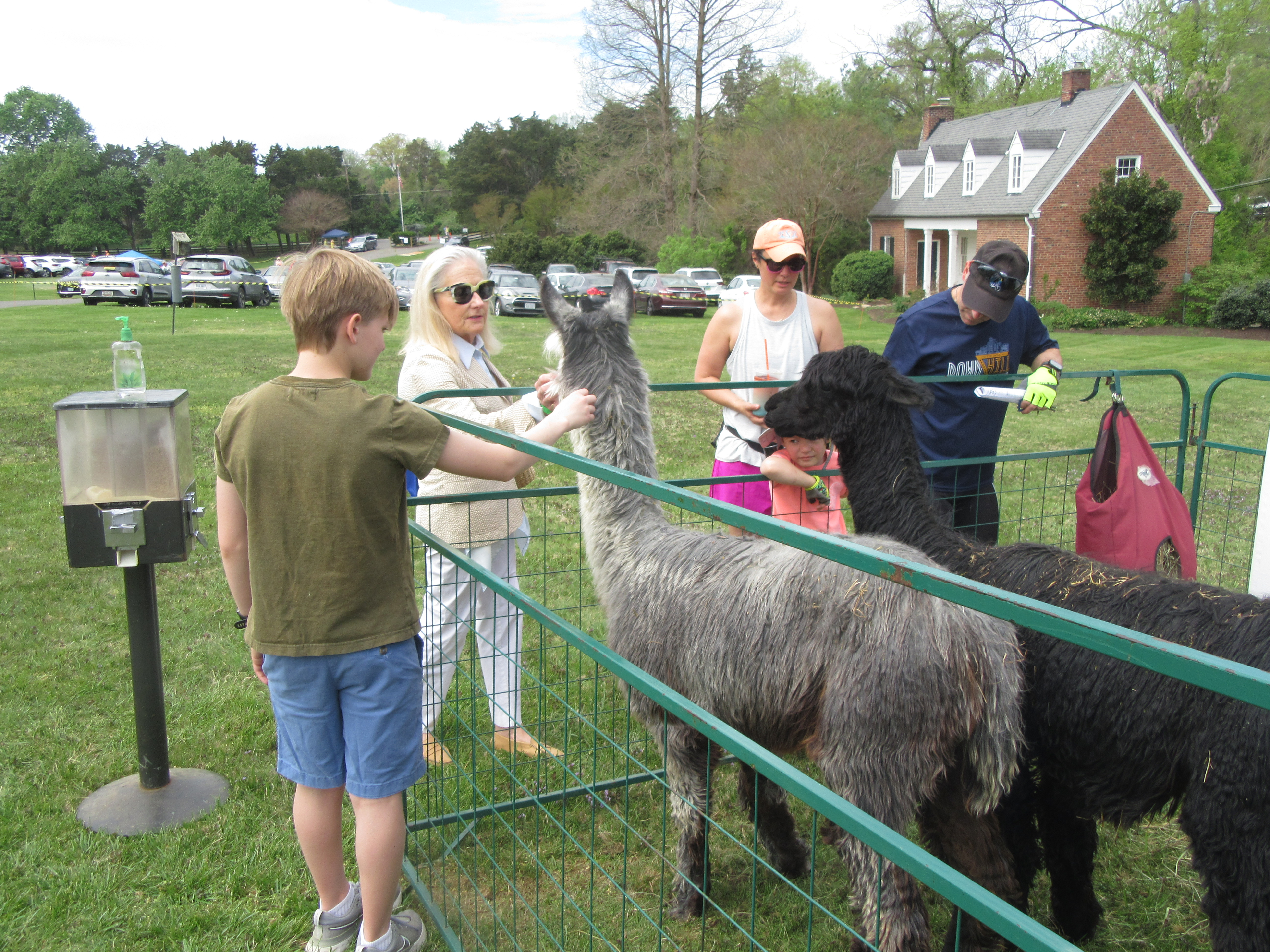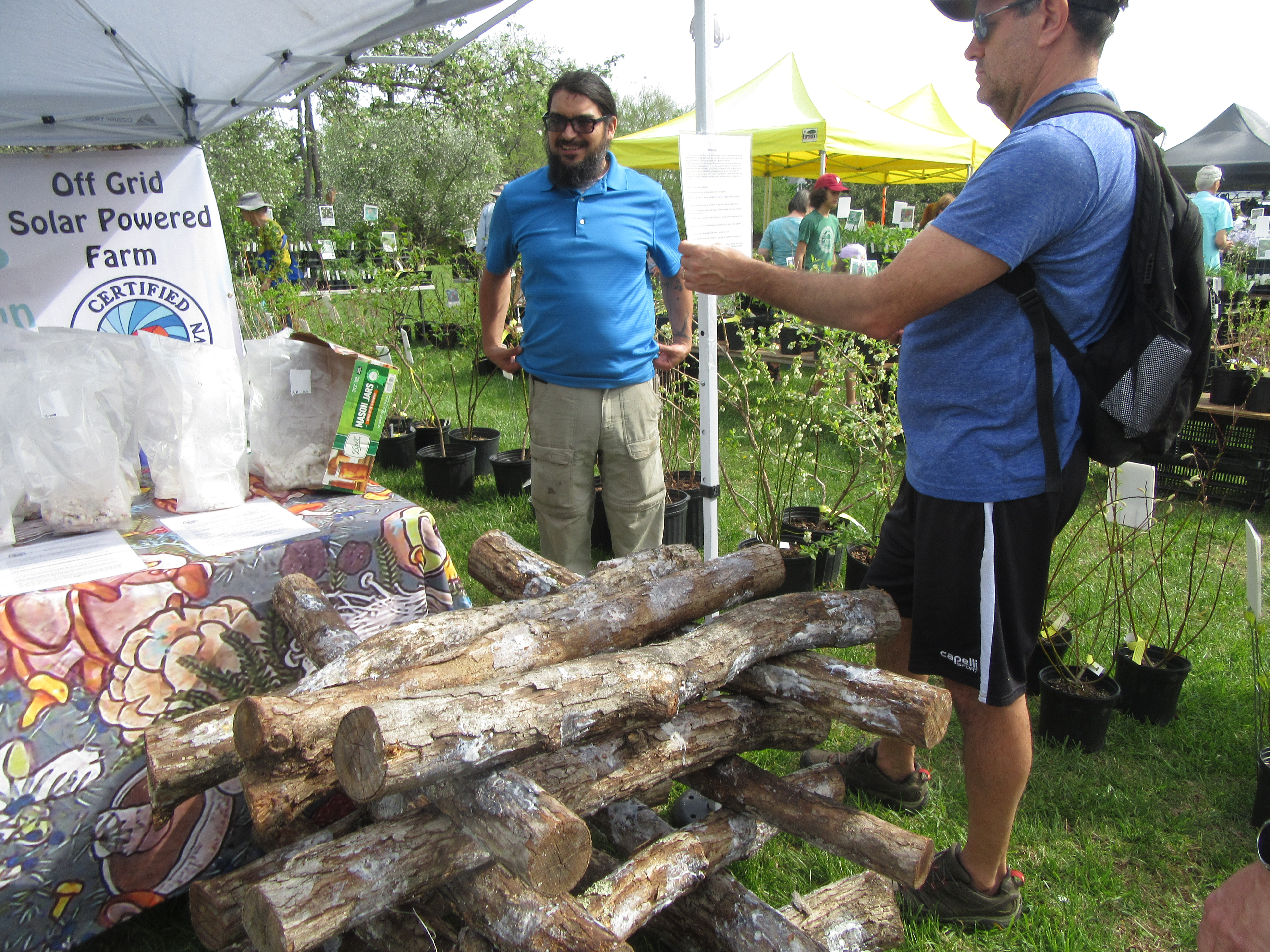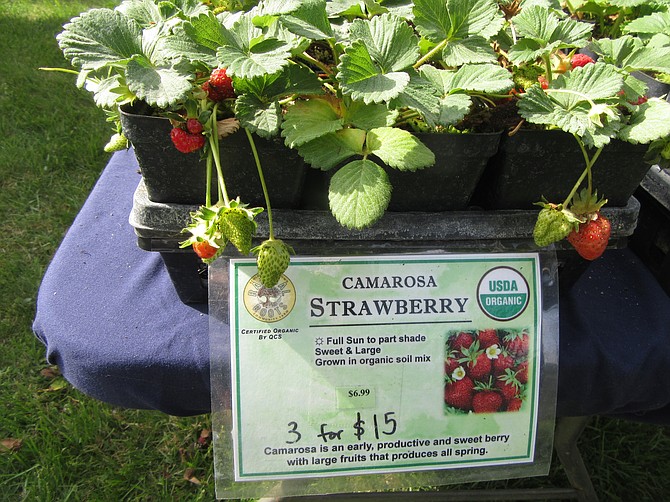The two-day event featured 37 vendors from as far away as Pawpaw, West Virginia and Keezletown, Virginia, who brought plants, seeds, seedlings, art, crafts, books and gardening accessories. From bluebells to basil, from peppers to poppies, from shiitakes to strawberries, the “plantophiles” meandered, browsed and searched for both common and rare finds from the plant world.
In the animal world, two male suri alpacas delighted all. David Headley brought Elliott and Milo from Tappahannock, Virginia, along with some alpaca products from Peru. Headley raises four alpacas and sells their fiber. These ungulates are generally docile, he patiently explained, but “a pregnant female can get fussy.” He added, “Alpacas have two sounds. Their alert call sounds like a goose screeching.”

Radical Roots Community Farm’s tables were bulging with organic herbs like basil and cilantro and heirloom tomato, strawberry and vegetable plants. These farmers come to the market every year from Virginia’s Harrisonburg area.
Janet Davis, owner of Hill House Farm and Nursery, from Castleton, Virginia, had a brisk business selling native plants like oxeye sunflowers, mountain mint and Virginia bluebells. “It’s how I make my living,” she said. She sells only native plants to help restore natural ecosystems. Her sign: “Native plants for native bees.” Jack and Diana Weil, who live in Tauxemont, go to the market every spring especially in search of native plants that will support native insects, which are declining, studies show.
 Anthony Murray explained how to grow shiitake mushrooms.
Anthony Murray explained how to grow shiitake mushrooms.
Nature by Design, another native plant vendor, has sold at the market for many years. Though managers had to close their Alexandria shop, they offer free delivery inside the Beltway in Virginia and in Alexandria zip codes, said Jared Berquist.
Denise Freeland, who lives in Wessynton, is grateful. She went to the AHS market “because the native plant vendors are awesome,” she said. She has transformed her Wessynton property from a yard smothered by invasive English ivy to native plants.
Acer Acres offered Virginia-grown Japanese maples. Bartlett Tree Experts, a sponsor, gave away free 24-inch, pin oak and sycamore seedlings. This was their first year. Sponsor McEnearney Realty representatives had a raffle and spinning wheel for prizes and offered heirloom seeds.
Even fungi had a prominent presence. First timers Sharon Biggs and Anthony Murray came from Peasant’s Parcel, their solar-powered, Pawpaw, West Virginia, farm and gave a tutorial on how to grow shiitake mushrooms. They had a waist-high stack of logs arranged box-style in front of their tent and Murray explained that they inject mycelium into holes drilled into the logs. This process propagates mushrooms in six months and can produce a “crop” in the spring and fall. If the weather is dry, minders may have to water the mushrooms, but generally, their growing technique is “sit and forget,” said Murray.
Garden-related arts, crafts and literature drew many shoppers. Bruce Ciske displayed several styles of his vases made in his Mount Vernon-area home studio, many for Ikebana, Japanese flower arranging.
First-timer Brianna Berkowitz from Virginia Beach dries and presses flowers into art pieces, like coasters, flower tiles and bouquets. She teaches her techniques at Alexandria’s Made in Virginia shop.
Alexandria’s Hooray for Books, staffed by Kathryn Howell-Dalton, sold adult and children’s gardening books and puzzles for their first time at the market.
Marylander George Frazier spread out colorful, hand-woven, fair trade baskets from Ghana. Some of the proceeds from his sales go to the basket weavers, to pay for books and health care, he commented.
Advice and Support
The Fairfax County Master Gardeners fielded questions like, “Can we plant tomatoes now?” At summer events, they typically get questions about weeds and insects, said Molly Gray. They discourage pesticide use. “You should know what the enemy is before dousing it with a chemical,” advised Gray.
Greg Meyer and Amelia Wilt staffed Northern Virginia Conservation Trust’s table. “We helped save River Farm,” said Wilt. In late 2020, the property was listed for sale, but an outpouring of opposition ultimately kept it as the AHS headquarters.
Dorothy Keogh, Hollin Hall resident, comes every year because River Farm is “a beautiful place,” she remarked as she befriended the alpacas. She likes to buy pineapple sage, specialty tomato plants, lavender and hellebores. Greg Crider is a faithful River Farm supporter. “I visit once a week,” he said.
Rocklands Real Barbeque food truck had a steady line of hungry patrons seeking the “tooth-pickin’ good” pulled pork and chicken BBQ and side dishes like potato salad, cole slaw and macaroni and cheese. Rocklands has locations in Alexandria, Arlington and Washington, D. C.
River Farm, today a 25-acre property, was the northernmost of George Washington’s five farms and once home to Tobias Lear, Washington’s secretary. The American Horticultural Society, founded in 1922, moved its national headquarters to the site in 1973.
